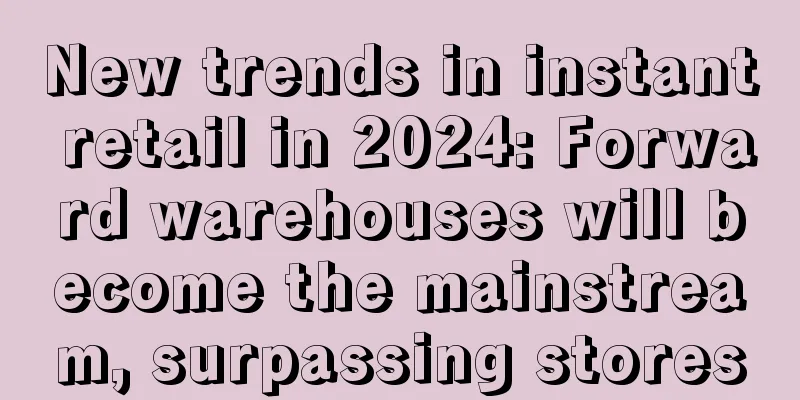The industry’s first “store visiting regulations” have been released. Is store visiting by internet celebrities a good business?

On February 16, Douyin Life Service released the industry's first "Store Visiting Standards" to crack down on false advertising and clarify the typical violations and corresponding penalties for both merchants and influencers. It has been piloted in eight cities including Chengdu, Nanjing, and Wuhan. A closer look at the content shows that it is more like a gentle pilot attempt than a heavy blow to the chaotic phenomenon of the store exploration economy. As a product of the integration of various forms of the Internet celebrity economy and the grass-planting economy in the era of self-media, the store exploration economy still has a long way to go before it can develop in a healthy and high-quality manner.
△Food blogger "Mi Zijun" visits the restaurant to taste the delicious Chongqing Jianghu cuisine Open Douyin, Xiaohongshu and other "good recommendation" platforms, and you will see a dazzling array of store exploration videos. Store exploration bloggers use exaggerated language and intoxicated expressions to show how delicious the food in front of them is and how affordable the group purchase price is. With the rise of social platforms such as Douyin and Xiaohongshu, the Internet celebrity economy and the grass-planting economy are booming, which has also led to the development of the store exploration economy. As a new form of cultural economy, store exploration has become a bridge connecting consumers and physical merchants. Since last year, governments in many places have proposed in a series of measures to promote consumption that they encourage catering and other enterprises to carry out consumption promotion activities through live streaming, store visits and other means. In 2022, on the Douyin life service platform, 72% of merchants invited influencers to visit stores and received orders. But at the same time, exaggerated publicity, false recommendations, malicious negative reviews and other chaos have gradually emerged, eroding the development of the industry. Under this situation, the industry's first "store visit regulations" were issued, which dealt a heavy blow to the industry chaos, as if we saw the dawn of the development of industry regulations. What requirements does this regulation make for store visit behavior? Can it lead the new business model of store visit to break the curse of the short-lived Internet celebrity economy and achieve sustainable development? 1. “Store Visiting Standards”, what do they regulate?Let's first look at the specific content of this store visit specification. According to the author's analysis, it mainly includes the following points. First, we will severely crack down on "false advertising" and impose corresponding penalties, including warnings, video removal, account downgrades, and banning submissions. The "false advertising" here mainly includes the behaviors of merchants and influencers making false and exaggerated descriptions of products, over-the-scope publicity, and fabricating the source and background of products. It is worth mentioning that false advertising is one of the most common chaos in the field of store exploration. According to China Development Network, Mr. Zhang from Ma'anshan, Anhui Province, said that he found a store exploration blogger on a short video platform who advertised the freshly-cold beef and mutton visible to the naked eye as "slaughtered on the same day" when dining at a well-known hot pot restaurant. There are even more unscrupulous store exploration bloggers who work with merchants to "beautify" products and exaggerate, and the abalone and lobster in the video are actually rotten fish and shrimp. Another typical case is in 2021, when the food blogger "Niudao" with millions of fans tried the same fried noodles from the same KFC twice in a row, but he showed two completely different "faces". When he tasted it for the first time, he complained that it was "too expensive" and "inedible", but two days later he changed his words to "tastes like my mother's cooking". The contrast was so great that it was astonishing. In addition, there is another important manifestation of false advertising - "cloud store exploration" which is purely based on editing and splicing, saving even the effort of visiting the store on the spot. The publisher only needs to splice and edit the existing materials, and then put the merchant's catering group purchase link on the shelves without going to the store, and realize commission after the sale. Some bloggers said that some merchants also directly provide materials for "cloud store exploration", which can be said to be a farce conspired by merchants and bloggers. Second, the cooperation rights and responsibilities of both merchants and influencers are clarified, and the behavioral standards and requirements that both parties should abide by in the links such as confirming intentions, making appointments for store visits, shooting in stores, content creation, and fulfillment and settlement are stipulated. Two modes, "free store exploration" and "cooperative store exploration", are introduced to match the needs of both parties. Among them, the "free store exploration" format is simpler and more flexible . Merchants do not need to provide meals and reception services. They only need to set commissions when posting needs. Experts can get commissions after freely exploring stores and posting videos. "Cooperative store exploration" can be said to be the plus version of "free store exploration" , which is a deep cooperation in store exploration behavior - merchants need to provide meals and reception services, and merchants need to set requirements for experts when publishing needs. Experts who meet the conditions can receive orders for store exploration and receive commissions. Therefore, "cooperative store exploration" has higher requirements for experts, and the commissions are also increased simultaneously. Third, several typical violation scenarios and corresponding penalties for both store explorers and merchants are clarified. For store explorers, the violation scenarios mainly include failure to visit the store at the agreed time, failure to publish the video as agreed (such as delayed publishing, non-publishing, setting private visibility, visible only to fans, etc.), and failure to keep the video continuously public. As for merchants, violation scenarios mainly include refusing to receive customers at the agreed time, failing to inform customers in advance of abnormal business conditions, failing to provide free meals as agreed, illegally launching homogeneous products online and guiding consumers to place orders for commission-free products, etc. Corresponding penalties are set according to the degree of violation. The author believes that the introduction of the "store visiting regulations" is not so much a heavy blow to the industry as it is more like a tentative pilot attempt - taking the catering industry, which has the most active store visiting business, as the pilot, and eight cities including Chengdu and Nanjing as pilot cities, and then gradually promoting it to the whole country and all walks of life after testing and optimization. However, whether it is the scope of the pilot, illegal behaviors or corresponding penalties, the coverage is relatively limited and general. There are no specific requirements for the more common chaos at present, such as influencers extorting and eating free meals, maliciously brushing good reviews, merchants selling goods that do not match the descriptions, and other more common and hidden illegal behaviors. In addition, the relevant penalties are also relatively light. For example, the penalties for violations by store explorers range from warnings, prohibition of accepting new business orders, and restriction of commissions on submissions for 7 to 15 days, depending on the number of violations. The penalties for violations by merchants range from warnings and education to prohibition of publishing new matchmaking plans for 7 to 20 days. It is more like a gentle warning against violations of store exploration regulations. Under the severe appearance, it may be more like a superficial rectification. 2. Store visits: a product of the internet celebrity economyA closer look reveals that restaurant visits have a long history and are not a new marketing practice. The beautiful anchors visit restaurants, interact with the owners and chefs, experience the cooking process, and then taste the delicious food, spreading the local food culture while subtly promoting the businesses. I believe we have seen this familiar scene in many food programs many years ago, but at that time we may have watched it through traditional channels such as TV programs. Today, with the rise of short videos and the popularity of social platforms such as Xiaohongshu, Video Account, and Douyin, store visiting behavior has shifted from traditional radio and television channels to emerging platforms such as APPs and mini-programs, covering videos, pictures, and texts. The themes are mainly catering, and have expanded to hotels, cultural and tourist attractions, and even beauty salons, sports and fitness, script-killing and other entertainment and leisure methods , often with direct purchase links attached to guide users to place orders. Compared with the past, the pace is shorter, flatter and faster, and the tendency towards commercial marketing is more obvious. For businesses, compared with previous flyer and TV promotions, store exploration marketing on platforms such as Douyin and Xiaohongshu undoubtedly has greater traffic and exposure, and can quickly win the favor of young people. On Douyin, the topic of "food store exploration" alone has more than 229 billion views, and the views of topics such as "store exploration experts" and "store exploration VLOG" range from tens of billions to hundreds of billions. For bloggers, store exploration, as an important vertical field of short videos and an important part of local life services, is very popular and has a low entry threshold. Any "food lover" can become a food blogger. Unlike fields such as popular science and medicine that require high professionalism, this also determines that store exploration has become the focus of many bloggers. In terms of business model, as far as I know, there are four types of business service models for store exploration:
△Live broadcast of the store visit, the blogger carefully introduced the characteristics of each bowl of ramen It is worth mentioning that the promotion costs of store bloggers are mainly affected by the number of fans . If the account has fewer fans and traffic, they can accumulate fans by advertising for the store for free in the early stage. After the number of fans reaches 1,000+, Douyin can open group purchase permissions, and you can publish group purchase links in the same city when you visit stores, and you can get commissions after the orders are verified. When the account level grows and the number of fans accumulates to tens of thousands, merchants in the same city will actively invite you to visit stores and offer free food and drinks to promote the business. 4. In the future, will it be standardized development or wild growth?In order for the store exploration economy to achieve healthy development, in addition to issuing relevant policies and establishing long-term mechanisms, multiple parties including store explorers and merchants also need to work together. For influencers, improving professionalism and ethics is the key, and treating consumers with sincerity is always the ultimate skill. As the saying goes, "water can carry a boat, but it can also capsize it." The relationship between consumers and influencers is actually like that between water and a boat, which is maintained by traffic. If store exploration experts ignore reality and blindly "plant grass", they will lose the trust of fans in the long run, which will backfire on their own development. As more and more store exploration experts emerge, the competition in the store exploration market will become more intense. Those bloggers who only seek profits and do not tell the truth, and who falsely plant grass and do not treat fans sincerely will be eliminated by the market. For merchants, no matter how many store visits and cooperations they have or how innovative their forms are, they are ultimately just a form of marketing and promotion. The key is to make good products and improve services. At a time when consumers are becoming more and more picky, only by focusing on quality, continuously providing more cost-effective products and services, and supplemented by excellent, innovative, and pragmatic marketing, can we win the favor of consumers. In general, the development of the store-exploring economy is the product of the integrated development of various forms such as the internet celebrity economy and the grass-planting economy under the era of self-media and the development of Internet technology. On the one hand, if the store-exploring economy develops in a standardized manner, it will greatly promote the creation of urban brands, promote the dissemination of urban culture such as urban cuisine and folk customs, and become an important carrier for displaying the city's style. For example, the rapid rise of internet celebrity cities such as Changsha, Chengdu, and Chongqing is closely related to the rise of the store-exploring economy. In addition, the development of the store exploration economy has also provided attention, influence and a continuously expanding market space for a number of store exploration bloggers and MCN agencies; it has also provided innovative marketing for merchants' product promotions, allowing products to reach consumers better and faster, and ultimately promoting cultural and tourism consumption and economic recovery. On the other hand, if the store-exploring economy is not regulated and supervised and is allowed to grow wildly, it will become a stumbling block that tarnishes the city's image and hinders its development. Its adverse effects are irreversible, and the harm it causes to consumers is enormous . It not only erodes consumers' trust, but also hinders the city's economic recovery and the orderly development of the market. It is also moving further and further away from the goal of creating a clean and healthy cyberspace. V. ConclusionThere is no doubt that the introduction of the industry's first "store visiting regulations" marks a new stage in the platform's governance of the store visiting business model. Under stricter supervision and governance, the industry will surely usher in healthier and more efficient development. At the same time, we must also realize that there is still a long way to go before the healthy development of the store exploration economy, which requires not only the self-discipline and self-respect of bloggers and the sincerity of merchants, but also the policy support of government departments and the establishment of a long-term governance mechanism. But at any time, a sincere attitude and excellent products and services are what the market calls for and what the people want. Author: Liu Shunxin Editor: Time Editor: Peninsula Source public account: Cultural Industry Review (ID: whcypl), China’s top new media for cultural industry. |
>>: Hiding in the momo army, being the last free soul on the Internet
Recommend
Can I get a tax refund for goods sold on Amazon?
As the Amazon platform continues to grow, more and...
Seizing the opportunity of her economy and Valentine's Day, is there a promising future for "e-commerce flowers"?
As living standards improve and young consumers pa...
What is the advertising slogan for new Amazon sellers? How to advertise?
As one of the world's largest e-commerce platf...
How can the annual sales of notebooks exceed 10 million by relying solely on Xiaohongshu?
In the competitive content ecosystem of Xiaohongsh...
The first large-scale incentive after the WeChat Store name change is here
After changing its name to Video Store, WeChat Sto...
How to create a million-level virtual anchor from 0 to 1?
After more than a year in the industry, with nearl...
I am still not optimistic about WeChat video e-commerce
This article elaborates on the reasons why the aut...
What problems can “closed-loop thinking” solve in corporate marketing?
The article revolves around the four words "c...
The same model of "Crazy" is selling like hot cakes, Taobao wins big
In the Internet age, hot topics always come one af...
What is the upper limit of eBay's bad transaction rate? What are the influencing factors?
In order to ensure a good user experience, eBay ac...
What is an Amazon courtesy refund? What are the reasons for a refund?
Many netizens like to buy goods on the Amazon plat...
Once again, I was touched by the fireworks copywriting of RT-Mart
The culture of pairing is all the rage, and brands...
The 7-episode short drama has been viewed over 100 million times, and the third generation of the rich has made the family business famous
The short drama "Towel Empire" became po...
With two shows grossing over 60 million, the leader of the entire network’s trendy live streaming has emerged!
Recently, a phenomenal live-streaming anchor Che C...
Video account Double 11 incentive policy is here
Double 11 is coming, and many platforms have annou...









